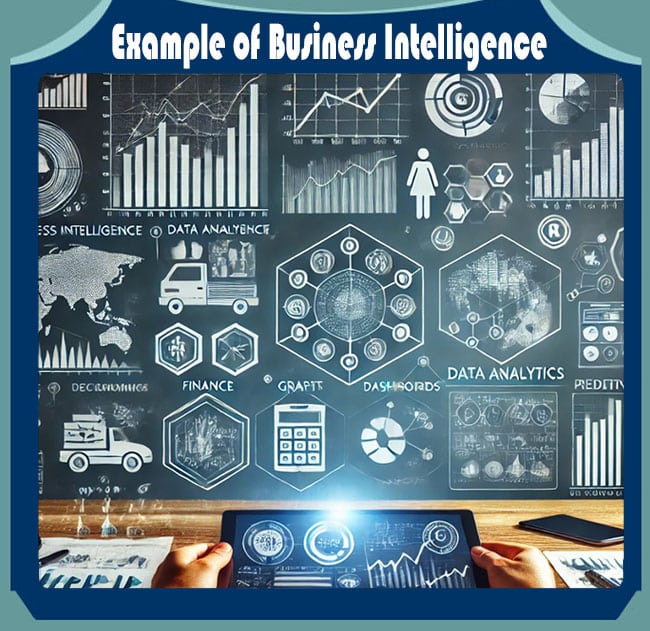Business Intelligence Examples: Real-World Applications
Business intelligence (BI) refers to the tools, technologies, and strategies used to analyze and interpret business data. By leveraging BI tools, companies can transform raw data into meaningful insights that drive decision-making, optimize processes, and enhance performance. In this article, we will explore several real-world examples of how business intelligence is being applied across different industries.

1. Business Intelligence in Finance
One of the most prominent sectors utilizing business intelligence is finance. Financial institutions use BI tools to track transactions, analyze market trends, and manage risks. BI allows them to:
- Monitor financial performance: Dashboards can display real-time metrics, such as revenue, expenses, and profitability, enabling financial managers to adjust strategies based on current performance.
- Risk management: Banks and financial companies use BI tools to assess credit risk, detect fraudulent activities, and comply with regulatory standards.
- Investment strategies: Predictive analytics, a component of BI, helps institutions forecast future market trends, enabling more informed investment decisions.
Example:
A bank may use BI to analyze customer transaction data. With dashboards displaying real-time financial metrics, executives can spot trends, identify profitable customer segments, and optimize marketing strategies.
2. Retail and E-commerce: Enhancing Customer Experience
In retail and e-commerce, business intelligence is a powerful tool for understanding customer behavior and improving sales. With the help of BI tools, businesses can:
- Track sales performance: Retailers can monitor daily, weekly, or monthly sales and adjust stock levels or marketing campaigns accordingly.
- Optimize inventory management: BI dashboards help track stock levels in real-time, ensuring optimal inventory management and reducing overstocking or stockouts.
- Personalized marketing: Using customer data analytics, retailers can offer personalized product recommendations, boosting customer engagement and sales.
Example:
An online retailer can analyze purchase patterns and use predictive analytics to suggest products to customers, leading to increased sales and improved customer satisfaction.
3. Healthcare: Improving Patient Care
Healthcare organizations use business intelligence to improve patient care, optimize operations, and meet regulatory compliance. BI tools in healthcare help:
- Improve patient outcomes: By analyzing patient data, healthcare providers can identify patterns and trends that inform treatment decisions.
- Optimize resource allocation: BI can analyze hospital operations, helping administrators allocate staff and resources more efficiently.
- Ensure regulatory compliance: BI dashboards help healthcare institutions track compliance with regulations, ensuring patient data privacy and adherence to industry standards.
Example:
A hospital can use BI tools to analyze patient records and treatment outcomes, enabling doctors to make data-driven decisions on the best course of care for future patients.
4. Manufacturing: Enhancing Operational Efficiency
In manufacturing, business intelligence plays a key role in monitoring production processes, optimizing supply chains, and maintaining quality control. BI tools allow manufacturers to:
- Monitor production: Real-time dashboards help monitor production output, detect bottlenecks, and maintain operational efficiency.
- Supply chain optimization: BI enables manufacturers to analyze supplier performance, inventory levels, and logistics to streamline the supply chain.
- Predictive maintenance: By analyzing machinery data, BI tools can forecast potential equipment failures, allowing manufacturers to perform maintenance before issues arise.
Example:
A factory uses BI dashboards to track machine performance and schedule preventive maintenance, reducing downtime and increasing overall productivity.
5. Marketing: Data-Driven Campaigns
In the marketing sector, business intelligence is essential for optimizing campaigns and enhancing customer targeting. Marketers use BI tools to:
- Analyze campaign performance: Real-time analytics help marketers assess the effectiveness of their campaigns and adjust strategies based on performance metrics.
- Understand customer behavior: BI allows companies to gain insights into customer preferences, enabling more effective segmentation and personalization.
- Forecast trends: Predictive analytics help marketers anticipate changes in customer behavior and market trends, allowing them to stay ahead of the competition.
Example:
A marketing team can analyze customer engagement data from a recent campaign and use BI to adjust targeting strategies for future campaigns, improving conversion rates.
Conclusion
Business intelligence is a vital tool for companies across a range of industries, helping them transform raw data into actionable insights. Whether it’s optimizing operations in manufacturing, improving patient care in healthcare, or enhancing customer experience in retail, BI tools empower organizations to make better decisions and achieve their goals.
By implementing BI, companies can stay competitive, adapt to changing market conditions, and ultimately, drive success.